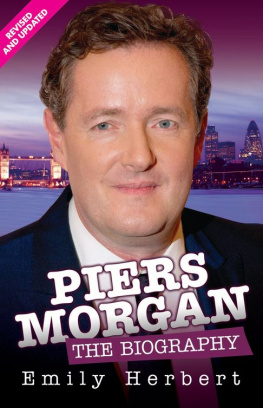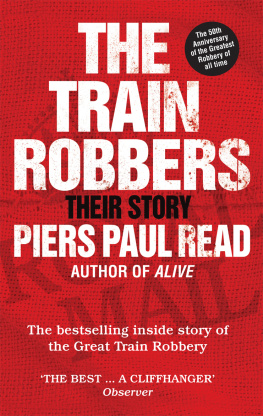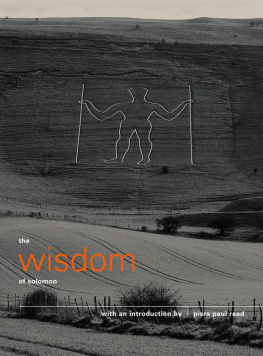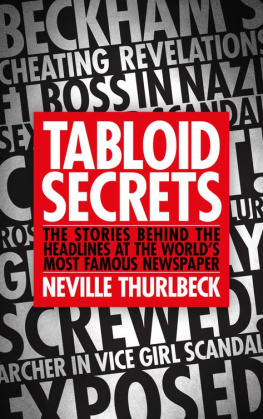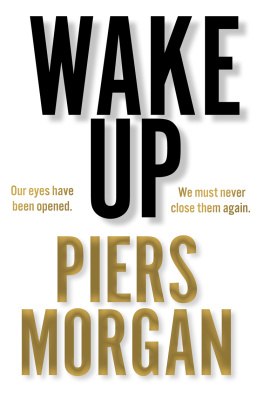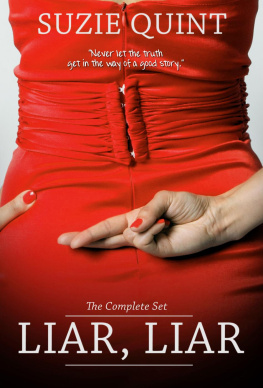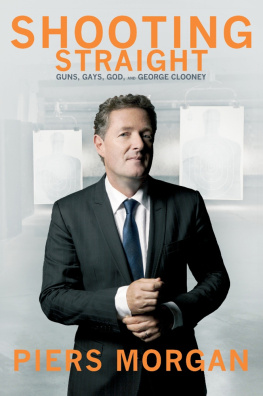T he year was 1965, and the Swinging Sixties were well under way: The Beatles and The Rolling Stones were battling it out for the title of Greatest-Ever Rock Band, while society was being turned on its head. Now the age of deference was over and a new egalitarian Britain was born, one that was to replace a keen interest in the lives of the aristocracy with an insatiable appetite for the world of the celebrity. And, on 30 March 1965, a child entered the world who would make a spectacular career on the back of that enthusiasm for celebrity before eventually becoming one himself: Piers Stefan Morgan had arrived. Legend has it that he was named after the brewery heir and privateer motor-racing driver Piers Courage certainly he would go on to lead a similarly tumultuous life.
Not that he was known as Piers Morgan back then; rather, he was Piers Stefan OMeara, the first of the two children of Eamon Vincent (a dentist) and Gabrielle OMeara. His younger brother Jeremy arrived shortly afterwards. Vincent, as he was known, would die before his son was one year old. When he died, I had a very strong mother and grandmother looking after me, being extra-strong for me and loving me unconditionally, Piers later recalled. My mother has always encouraged her four children [she went on to have two more with her second husband] to live their dreams. If weve ever been in trouble, shes defended us like a lioness. In fact, Vincent passed away tragically early, at thirty-one; he had been in a car accident and died in the ambulance taking him away from the wreckage.
Piers Morgans public persona has been a rumbustious one; never afraid of controversy, happy to participate in feuds and always giving as good as he gets. He comes across as extremely brash, something which caused quite a few people to dislike him at one stage in his career, although he calmed down considerably once he made the move from the medium of the printed word to television. Yet there was tragedy in his life from a very early age: to lose a father so young was a terrible sadness. Although he was lucky enough to acquire a stepfather, with whom he became really close, Piers has more in common with the celebrities who tell him about their own problems on ITVs Piers Morgans Life Stories than would at first seem obvious. Whats more, he can be far more sympathetic than anyone might expect.
But Piers relationship with his mother was strong and this was to see him through the most difficult times until she married for the second time and provided him with a father figure. Although born and brought up in Sussex, he actually has a more international background. Technically, he is one-quarter English, three-quarters Irish (with a little Spanish thrown in): his mother Gabrielle Oliver was born in Battle, Sussex in the 1940s, to Matthew Dudgeon Oliver and Edith Margot Cantopher, who later divorced. Their story is typical of Britain at that time: a life spent in the Colonies, specifically India. Piers maternal great-grandfather William Joseph Cantopher was born in the province of Deccan in 1891. Williams father Bernard was a London University-educated civil engineer, who worked in Berhampore, Murshadibad and Bengal; William later returned to Britain in 1911, where he worked as a stockbroker. He married Edith Mary Kelly, also of Irish descent.
William and Edith had a daughter, Edith Margot, who married Matthew Dudgeon Oliver (who, just to complicate matters, was the son of John Dudgeon Oliver, who was born in China), and it was Matthew, Piers grandfather, who would go on to work on the Sunday People newspaper. Other ancestors have been traced back to Spain and Scotland. Mostly due to this Irish background, the majority of Piers forebears are Catholic but there is some Presbyterianism in there, too.
When Piers was still a toddler, his artist mother remarried a man with the rather splendid name of Glynne Pughe-Morgan, from whom he took his surname. The couple went on to have two children, Rupert and Charlotte. Indeed, it was only when he started to make his way as a journalist that Piers dropped the Pughe to make himself seem more egalitarian. In truth, however, his was a privileged background to begin with, at least.
As an adult, he developed a healthy respect for his brother Jeremy, who went on to serve in the Army (eventually rising to Lieutenant Colonel) but during their childhood the two battled constantly, as small boys will. Piers used to torment me and physically bully me when we were small, Jeremy later told the Sunday Times Relative Values. I remember him hitting me over the head repeatedly with a small, rubber yellow hammer. My mother couldnt leave us alone. Later on, hed bully me psychologically niggle, niggle, niggle until I got into a rage and beat him to a pulp. He fought like a girl, so he was easy to overcome.
Piers remembers something similar. My brother wasnt the most quick-witted of spanners, he told the Sunday Times. He had a very short fuse; I found it amusing to light it and watch it explode. We were very competitive and my mother did everything to stop us fighting. Ive just always loved verbal combat; my whole family are like that rebellious, into debating and feuding. Were Irish Catholics. It gets fiery. I love it.
Of course, the two are extremely close in age and it was clear, listening to both of them, that they were extremely pugnacious. Neither has ever been afraid of a tussle, albeit in very different fields: Piers in the world of celebrity and Jeremy out on the battlefield. But the existence of a younger brother was to give Piers a moral authority in later years, something he couldnt have dreamed about back then: when he was criticised for apparently not supporting the War on Iraq while he was editor of the Mirror. In his defence, he could point out that his own brother was serving in the Army and, naturally, he backed our boys; it was just the field in which they were fighting that he didnt like.
But the journalism bug bit very young, as did the bad habits that famously go along with it. I was really into newspapers at five or six, and used to point out the headlines that grabbed me, Piers revealed in an interview with the Independent. I learned to read through the papers; whether this is good or bad, I have yet to work out. My parents ran the Griffin Inn and at Fletching C of E Primary, near Lewes, East Sussex, I was one of the few kids who every night went to the local pub. Ever since then, as a journalist, I have staggered to the pub after work.
Indeed, he did more than that, helping his parents run their business from a very young age. I used to do the bottling up at 5am, then come to school, he revealed in later years. I used to get in trouble for that [at school]. I think they thought I had an alcohol problem as a child.
He maintains this is where his somewhat brash personality began to develop. Pubs are not places for quiet people and the young Piers was forced to fight to get heard. He succeeded, and began to develop a trademark style from an early age. I was always very cocky and noisy in the pub, he admits. I loved holding forth, hearing the sound of my own voice, and a lot of people found it amusing so I just carried on. It was a philosophy he was to continue into later life.
And he was a clever boy; although Piers would never shine academically, his achievements have been enough to defeat many a lesser man and required a good deal of native wit, something he possessed right from the start. Piers was unusually bright: at four he was reading Tolkien, his brother Jeremy recalled. Later, he was into newspapers and Arsenal Football Club. I liked rugby, fishing and Commando magazine. We led independent lives, apart from cricket: we played it endlessly in our garden in Sussex. We became known at Sussex County Cricket ground Imran Khan even invited us to the nets to bowl at him.

